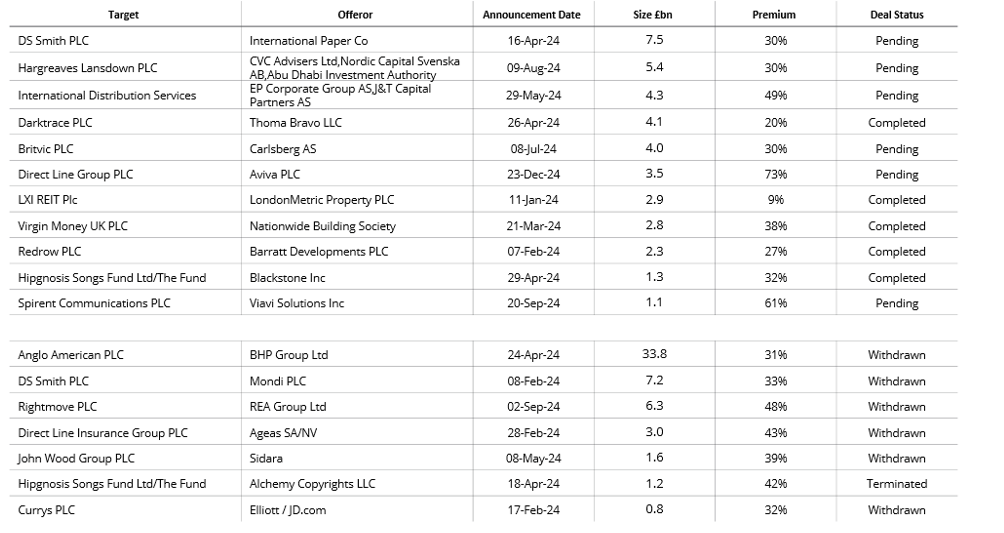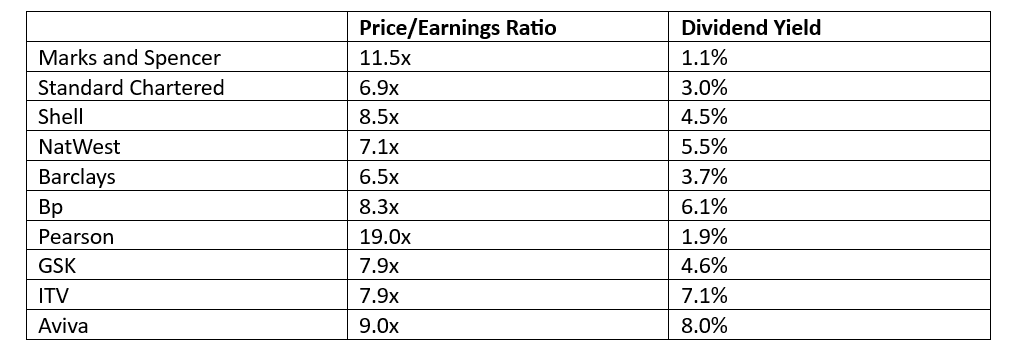Since we believe that managers ‘start of year outlooks’ are rarely of any use, we do not intend adding to dozens that have already been published. Instead, our natural contrarian instincts inspire us to look backwards rather than forwards so below we review what we were saying last year and how it turned out.
In a note entitled ‘The Return of the Total Return Kings’ published early in 2024, here we identified two catalysts that we thought could realise some of the significant levels of value that we observed in the UK equity market: corporate takeovers and share buybacks. So how did that work out?
1.Corporate Takeovers
In early 2024 we stated the following:
‘The relentless selling of UK equities has driven valuations to such low levels that overseas corporates have spotted an opportunity to acquire UK assets at prices that offer serious potential to achieve an attractive return……… UK investors have to accept that if they are going to drive valuations down to such low levels, overseas corporates are going to take advantage of them, and they mustn’t complain when large numbers of UK companies are swallowed up by their international rivals.’
This turned out to be an accurate prediction as 2024 was a year in which UK plc had its ‘Barbarians at the Gate’ [1] moment as overseas corporate buyers and private equity firms took advantage of the low valuations of UK businesses created by valuation agnostic selling of UK equities. The TM Redwheel UK Equity Income Fund benefitted from these with IDS and Direct Line being taken over whilst Currys and Anglo American received approaches that they successfully rebuffed.
The UK equity market saw notable bid activity in 2024

2. Share buybacks
In the same note, we demonstrated how firms consistently buying back lowly valued shares can create significant value through the case studies of Next plc and BATS and also highlighted how some of our current investments had the ability to replicate this (hence the title ‘The Return of the Total Return Kings’.) Having urged many of the companies that we invest in to take advantage of their lowly valued shares, we were delighted to see many of them implement these policies in 2024 often with considerable benefits to shareholders. The biggest successes were NatWest Bank and Barclays who reduced their share count by 9% and 5% respectively and saw their share prices rise by 83% and 72% [2] but around two thirds of the companies in the portfolio are currently buying back their own shares.
Where does this leave us now?
As previously mentioned, the share prices of several stocks in the portfolio rose considerably during 2024. Some were the result of bid activity, others were beneficiaries of consistent and sizeable share buybacks. This may prompt some investors to reflect on their strategy as we transition from one year to the next, but we believe this would be a mistake driven by a cognitive bias known as anchoring.
The anchoring effect [3] is ‘a psychological phenomenon in which an individual’s judgments or decisions are influenced by a reference point or “anchor” which can be completely irrelevant’. In one famous study by Amos Tversky and Daniel Kahneman [4], participants were asked to estimate the percentage of African countries in the United Nations. Before estimating, the participants first observed a roulette wheel that was predetermined to stop on either 10 or 65. Participants whose wheel stopped on 10 guessed lower values (25% on average) than participants whose wheel stopped at 65 (45% on average). Thus, their estimates were influenced or ‘anchored’ off a data point that had no relevance to what they were being asked to forecast.
Similarly in the stock market, investors tend to anchor off certain share prices which actually contain little information about the value of the stock they are analysing. Instead, we would argue that current valuations are a better guide to future returns than historic or current share prices and as the table below demonstrates, the holdings in the fund continue to be lowly valued relative to their history. Indeed, the average P/E of the fund is 9x.
TM Redwheel UK Equity Income Fund - Top Ten Holdings

Conclusion
In a world in which many investors seem obsessed with the large US technology companies (colloquially known as ‘The Magnificent Seven’), it is worth noting that some of the fund’s holdings produced returns last year that were on a par with them. And yet, in contrast to the reassurance we find in the low PEs and high dividend yields evident in the portfolio, the high valuations of the Magnificent Seven stocks should give investors pause for thought about how sustainable these returns can be.
To conclude therefore, in looking back at the returns delivered in 2024, we find considerable fundamental reasons for confidence when looking at what our portfolio can deliver for shareholders in 2025 and beyond.
Sources:
[1] The phrase ‘Barbarians at the Gate’ originates from the title of a book by Bryan Burrough and John Helyar, chronicling the aggressive leveraged buyout of RJR Nabisco in the late 1980s – it is now regularly used to describe opportunistic corporate takeover activity.
[2] Bloomberg 9th January 2025
[3] According to Wikipedia
[4] Judgement Under Uncertainty, Heuristics and Biases, Kahneman and Tversky 1974
Key Information
No investment strategy or risk management technique can guarantee returns or eliminate risks in any market environment. Past performance is not a guide to future results. The prices of investments and income from them may fall as well as rise and an investor’s investment is subject to potential loss, in whole or in part. Forecasts and estimates are based upon subjective assumptions about circumstances and events that may not yet have taken place and may never do so. The statements and opinions expressed in this article are those of the author as of the date of publication, and do not necessarily represent the view of Redwheel. This article does not constitute investment advice and the information shown is for illustrative purposes only.


